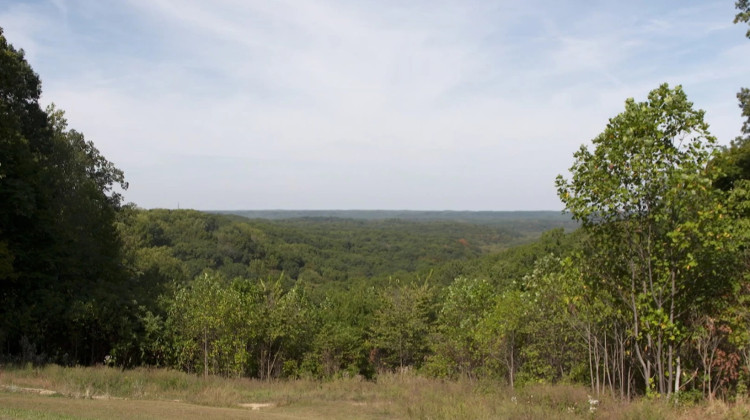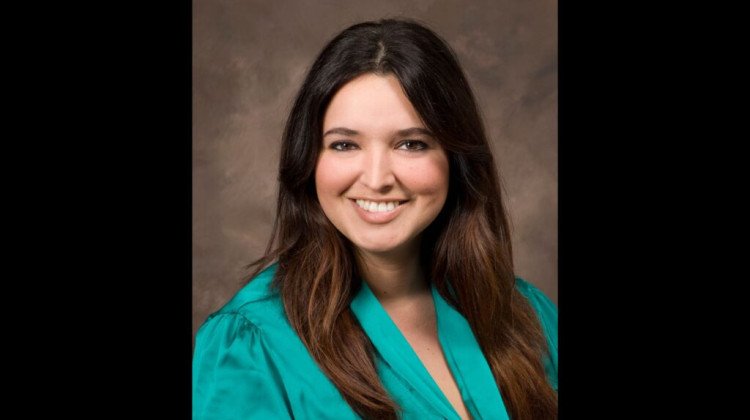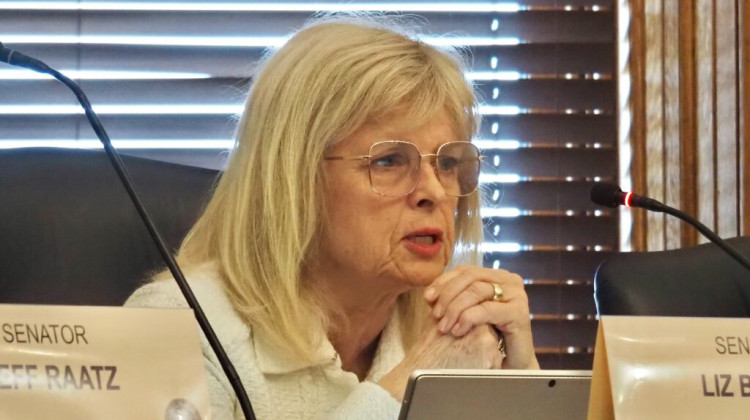
Brown County Playhouse has new seats, lighting and sound systems, and more.
Joe Hren, WFIU/WTIU NewsThe Brown County Playhouse opened almost 73 years ago with a stage and dirt floor. Now it boasts a new light and sound system, bigger stage, and other amenities.
Nashville’s tourism industry has expanded over the years, but officials can’t count on it to fund the town’s needs.
Nashville Town Council president Nancy Crocker says the Brown County Playhouse used downtime during COVID-19 to upgrade the 425-seat venue.
“We had an Acrobat team not long ago hanging from the rafters so, we can offer a lot of things,” she said.
Once run by Indiana University’s summer theater – the nonprofit is booking more concerts and shows.
Ticket sales barely cover the acts. The playhouse uses sponsors, grants, and other fundraising efforts to pay it’s $15,000 monthly bills.
That doesn’t leave playhouse staff much left to pay for other things. They’re hoping to get some of the county innkeeper’s tax money to fund a marketing budget.

The innkeeper’s tax is used to promote tourism, including the new 2,000-seat Brown County Music Center – and the food-and-beverage tax pays for public restrooms and parking.
Crocker says that doesn’t leave much to fund city services.
Director of Indiana University’s Public Policy Institute, Tom Guevara says a full music center almost doubles the town’s population.
“You're going to have to provide extra water to them, you're going to actually have increased capacity needs for your sewage treatment plant, who pays for that?” Guevara said.

Crocker says the burden lies on the town’s residents.
“The money that it generates doesn't really fall over into supporting the community. Since it's nonprofit, they don't really pay property taxes. And any of their profits, none of that goes back into the tourism industry.”
The town grew only a few hundred people from a decade ago – not enough to increase the tax base to fund infrastructure needs.
“If we can't somehow support the people that live here, then we can't support the tourism, either,” Crocker said.

A fire ripped through a couple downtown shops in March. The town’s volunteer fire department was able to contain the fire, but Crocker said, this time they were lucky.
“We're all smushed in here into the town. So, if one building burns, another building burns, another building burns. Again, if it had been windy that day, it could have been a lot worse,” Crocker said.
The town would like to switch to a fire territory, but that takes money too. Brown County has a 2.52 percent income tax rate – 11th highest in the state.
Tourism does bring jobs, but Crocker says the mean income of a Nashville resident is 19 percent below poverty level.
And municipal consultant Dax Norton says the town is looking at $15 to $20 million worth of water and sewer maintenance work.
“There's only one way to raise that revenue to pay that debt. And that's raised rates. Nobody wants rates raised. But how else are we going to do this?”
Norton says the new federal infrastructure bill will bring a lot of money to the state in the next five years, and the town is working to qualify for it.
And the town could gain a big customer to its water and sewer plant. Brown County State Park is looking to fully connect to Nashville’s utilities.
“We have 1950 infrastructure in 2022. And we don't have 2022 revenues, or methods to pay for that. You can't go into too much debt, because constitutional debt limits, so you're kind of stuck,” Norton said.
The town also has a hard time drawing a large industry tax base due to the terrain and utility capacity.
Norton says the town and county are partnering to work on bicycle-pedestrian infrastructure and sidewalk connectivity.

Guevara says the Indiana legislature tightly controls what local governments can do, which greatly affects how small towns can raise revenue. And the state’s priority now is to cut taxes.
“Rather than saying, is there anything that we can do to help local communities more with some of the challenges they're facing? Their choice is to say, let's put it in the hands of taxpayers,” Guevara said.
Indiana collected nearly $1 billion more in taxes last month than the state budget projected. That puts Indiana on pace for budget reserves that could top $6 billion.
Crocker says the people of Nashville want to keep it a small town -- they love their small town.
“But unless we grow or unless we do something creative to bring money, and we don't we don't have enough money to support the infrastructure for a small town.”
 DONATE
DONATE







 Support WFYI. We can't do it without you.
Support WFYI. We can't do it without you.